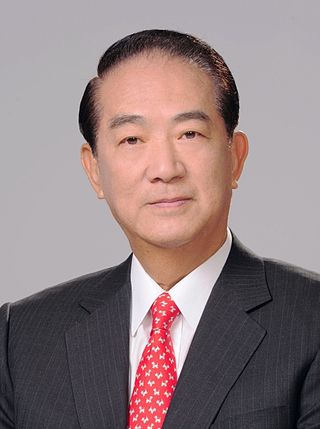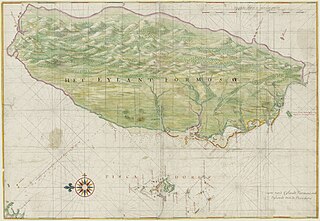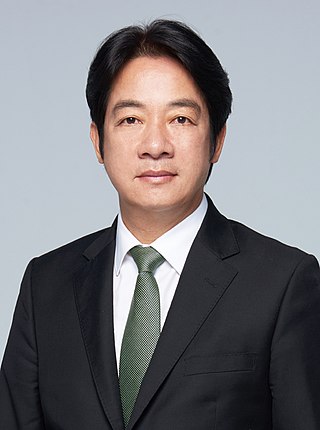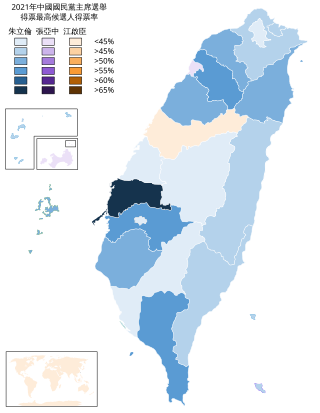
Lee Teng-hui was a Taiwanese statesman and agriculturist who served as the 4th president of the Republic of China (Taiwan) under the 1947 Constitution and chairman of the Kuomintang (KMT) from 1988 to 2000. He was the first president to be born in Taiwan, the last to be indirectly elected and the first to be directly elected. During his presidency, Lee oversaw the end of martial law and the full democratization of the ROC, advocated the Taiwanese localization movement, and led an ambitious foreign policy agenda to gain allies around the world. Nicknamed "Mr. Democracy", Lee was credited as the president who completed Taiwan's democratic transition.

The president of the Republic of China, commonly known as the president of Taiwan, is the head of state of the Republic of China (Taiwan) as well as the commander-in-chief of the Republic of China Armed Forces. The position once had authority of ruling over Mainland China, but its remaining jurisdictions has been limited to Taiwan, Penghu, Kinmen, Matsu, and other smaller islands since the conclusion of the Chinese Civil War.

James Soong Chu-yu is a Taiwanese politician who is the founder and current Chairman of the People First Party. Soong was the first and only elected Governor of Taiwan Province from 1994 and 1998. He was a candidate in the 2000 presidential election, which he lost to Chen Shui-bian of the Democratic Progressive Party (DPP).

The National Assembly was the authoritative legislative body of the Republic of China, from 1947 to 2005. Along with the Control Yuan and the Legislative Yuan, the National Assembly formed the tricameral parliament of the Republic of China.

The Constitution of the Republic of China is the fifth and current constitution of the Republic of China (ROC), ratified by the Kuomintang during the Constituent National Assembly session on 25 December 1946, in Nanjing, and adopted on 25 December 1947. The constitution, along with its Additional Articles, remains effective in ROC-controlled territories.

Yen Chia-kan, also known as C. K. Yen, was a Chinese chemist and Kuomintang politician. He succeeded Chiang Kai-shek as the 2nd president of the Republic of China on 5 April 1975, being sworn in on 6 April 1975, and served out the remainder of Chiang's term until 20 May 1978.

The premier of the Republic of China, officially the president of the Executive Yuan, is the head of the government of the Republic of China of Taiwan and leader of the Executive Yuan. The premier is nominally the principal advisor to the president of the republic and positioned as the head of central government.

As a result of the surrender and occupation of Japan at the end of World War II, the islands of Taiwan and Penghu were placed under the governance of the Republic of China (ROC), ruled by the Kuomintang (KMT), on 25 October 1945. Following the February 28 massacre in 1947, martial law was declared in 1949 by the Governor of Taiwan, Chen Cheng, and the ROC Ministry of National Defense. Following the end of the Chinese Civil War in 1949, the ROC government retreated from the mainland as the Chinese Communist Party (CCP) proclaimed the establishment of the People's Republic of China. The KMT retreated to Taiwan and declared Taipei the temporary capital of the ROC. For many years, the ROC and PRC each continued to claim in the diplomatic arena to be the sole legitimate government of "China". In 1971, the United Nations expelled the ROC and replaced it with the PRC.

The vice president of the Republic of China, commonly referred to as the vice president of Taiwan, is the second-highest constitutional office of the Republic of China, commonly known as Taiwan.

The Government of the Republic of China, commonly known as the Government of Taiwan, is the national authority whose actual-controlled territory consists of main island of Taiwan (Formosa), Penghu, Kinmen, Matsu, and other island groups, collectively known as Taiwan Area or Free Area. A unitary state, the government of Taiwan is run by a semi-presidential system, consists of the presidency and five branches (Yuan): the Executive Yuan, Legislative Yuan, Judicial Yuan, Examination Yuan, and Control Yuan. The president is the head of state, with the premier as the head of government, currently ruled by the Democratic Progressive Party (DPP) since 2016. Since 2005, the Legislative Yuan has been the unicameral parliamentary body of the country.

The 10th National Congress of the Kuomintang was the tenth national congress of the Kuomintang, held between 29 March to 9 April, 1969 in Chung-Shan Building, Beitou District, Taipei, Nationalist China.
Indirect presidential elections were held in the Republic of China on March 22, 1954 to elect the President and Vice President. The vote took place at the Chung-Shan Hall in Taipei. Incumbent President Chiang Kai-shek was re-elected for the second term. The premier Chen Cheng was elected to be the Vice-President. These were the first elections that took place since the fall of the mainland to the Chinese Communist Party in 1949.

Indirect elections were held for the presidency and vice-presidency of the government of the Republic of China on Taiwan on March 21, 1966. The vote took place at the Chung-Shan Hall in Taipei. Incumbent President Chiang Kai-shek was re-elected for the fourth term with his Vice-President Yen Chia-kan.

Indirect elections were held for the presidency and vice-presidency of the government of the Republic of China on Taiwan on March 21, 1972. The vote took place at the Chung-Shan Building in Yangmingshan, Taipei. Incumbent President Chiang Kai-shek, aged 85, was re-elected for the fifth term with his Vice President Yen Chia-kan. President Chiang died in office on April 5, 1975. Vice President Yen Chia-kan then sworn in as the President.
Indirect elections were held for the presidency and vice-presidency of the government of the Republic of China on Taiwan on March 21, 1978. The vote took place at the Chung-Shan Building in Yangmingshan, Taipei. Premier Chiang Ching-kuo, son of former President Chiang Kai-shek, was elected as the President with Governor of Taiwan Province Hsieh Tung-min who became the first Taiwan-born Vice President.

Indirect elections were held for the presidency and vice-presidency of the government of the Republic of China on Taiwan on March 21, 1984. The vote took place at the Chung-Shan Building in Yangmingshan, Taipei. Incumbent President Chiang Ching-kuo was re-elected for the second term with Governor of Taiwan Province Lee Teng-hui as the Vice President.
Indirect elections were held for the presidency and vice-presidency of the government of the Republic of China on Taiwan on March 21, 1990. The vote took place at the Chung-Shan Building in Yangmingshan, Taipei. Incumbent President Lee Teng-hui was elected, with Secretary-General to the President Lee Yuan-tsu as the Vice President. It was the last indirect presidential election in Taiwan.

Presidential elections were held in Taiwan on 11 January 2020 alongside Legislative Yuan election. Incumbent president Tsai Ing-wen and former premier Lai Ching-te of the Democratic Progressive Party (DPP) won the election, defeating Kaohsiung mayor Han Kuo-yu of the Kuomintang (KMT) and his running mate Chang San-cheng, as well as third-party candidate James Soong.

The 2019 Kuomintang presidential primary was held after 22 May 2019 through a series of nationwide opinion polls in order to determine its nominee for the President of the Republic of China in the 2020 presidential election.

The 2021 Kuomintang chairmanship election was scheduled to be held in July 2021. It was postponed due to the COVID-19 pandemic, and eventually rescheduled for 25 September 2021. It was the tenth direct election of the party leader in Kuomintang (KMT) history. All registered, due-paying KMT party members were eligible to vote.
















